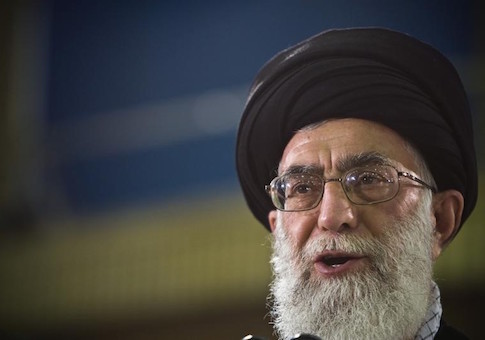By Parisa Hafezi
ANKARA (Reuters) - Iran's Supreme Leader Ayatollah Ali Khamenei said on Wednesday U.S. military threats made in the last few days may scupper nuclear talks as Tehran and six major world powers try to meet a June 30 deadline for a final deal.
Khamenei, who has the final say on all state matters, said two U.S. officials have threatened Iran with military action if the talks fail. He gave no further details on the threats.
"Holding nuclear talks (with major powers) under shadow of threat is unacceptable for Iran ... Our nation will not accept it ... Military threats will not help the talks," he said in a speech to a gathering of teachers broadcast live on state TV.
"In the past days, two U.S. officials have threatened to take military action against Iran if Iran refuses to accept this or that nuclear condition. What does negotiation mean under the shadow of threat," he said to chants from the crowd of "Death to America" and "Death to Israel".
"I am against holding (nuclear) talks under the shadow of threat."
Khamenei repeated his cautious support for the nuclear talks but said that the country's "red lines" should be respected by the Iranian negotiators.
"Our negotiators should continue the talks with respect to our red lines... But they should not accept any imposition, humiliation and threat," he said.
Iran says its nuclear program is entirely peaceful and rejects allegations from Western countries and their allies that it wants the capability to produce atomic weapons. It says all sanctions are illegal.
Iran and the six world powers, which struck a tentative nuclear agreement on April 2 in Lausanne, Switzerland, wrapped up nearly a week of talks in New York on Tuesday.
However, Western diplomats told Reuters that Iran and the powers were struggling to overcome deep divisions on two major sticking points: reimposing U.N. sanctions if the Iranians violate the agreement and how Tehran can buy atomic technology.
The two sides still disagree on other big issues including how quickly international sanctions would be lifted under a final deal.
Khamenei has demanded all sanctions be lifted at the same time as any deal is concluded. The U.S. and its European allies in the talks have made it clear that sanctions against Iran would be removed gradually.
The U.S. and EU sanctions have choked off nearly 1.5 million barrels per day (bpd) of Iranian oil exports since early 2012, reducing its oil exports by 60 percent to about a million barrels a day.
"We want the sanctions to be removed, but it does not mean that if they are not lifted, we cannot manage the country," Khamenei said.
"Of course it will be easier to run the country if the sanctions are lifted."
The negotiations between Iran, the United States, Britain, France, Germany, Russia, China and the European Union will resume in Vienna next week to pave the way for the final deal.
(Editing by Louise Ireland)
